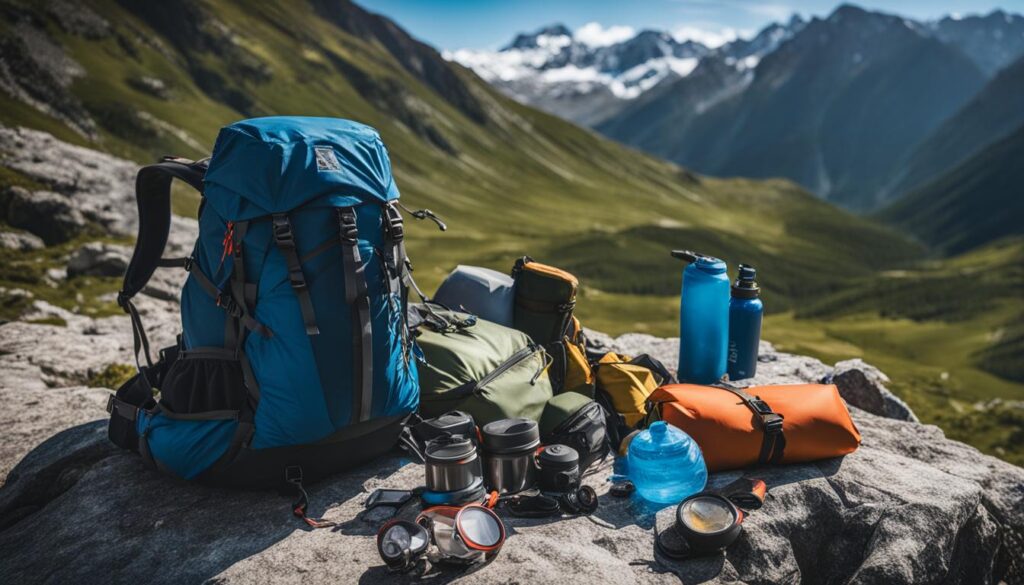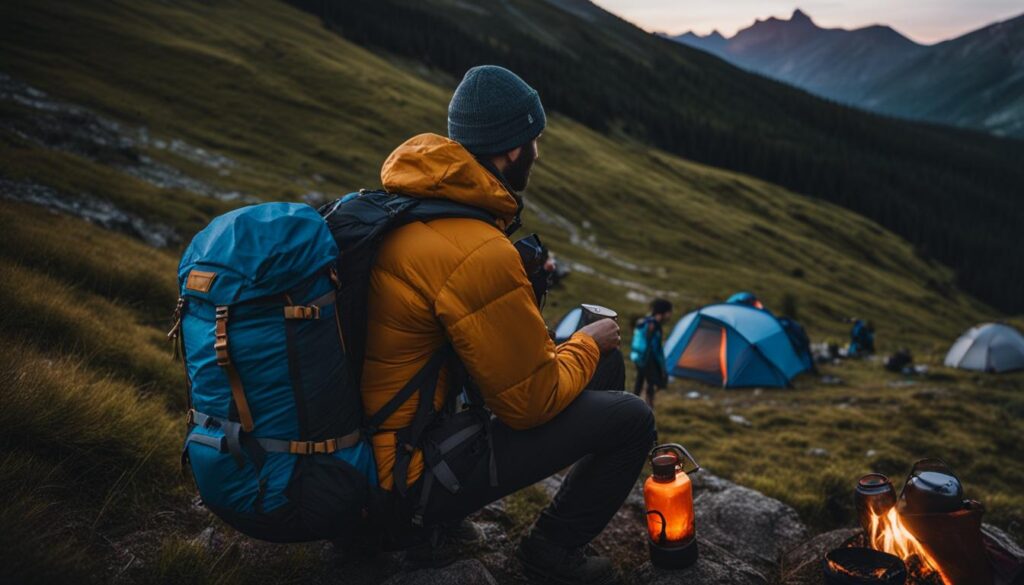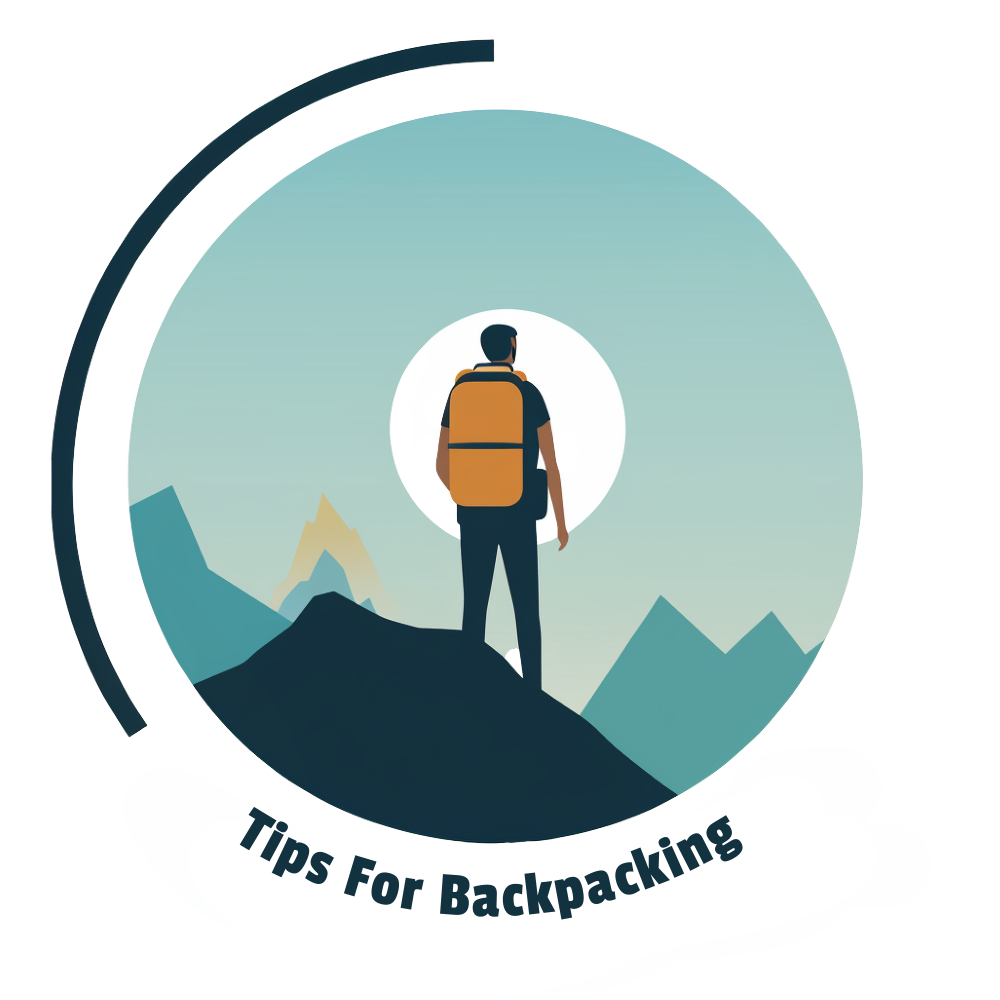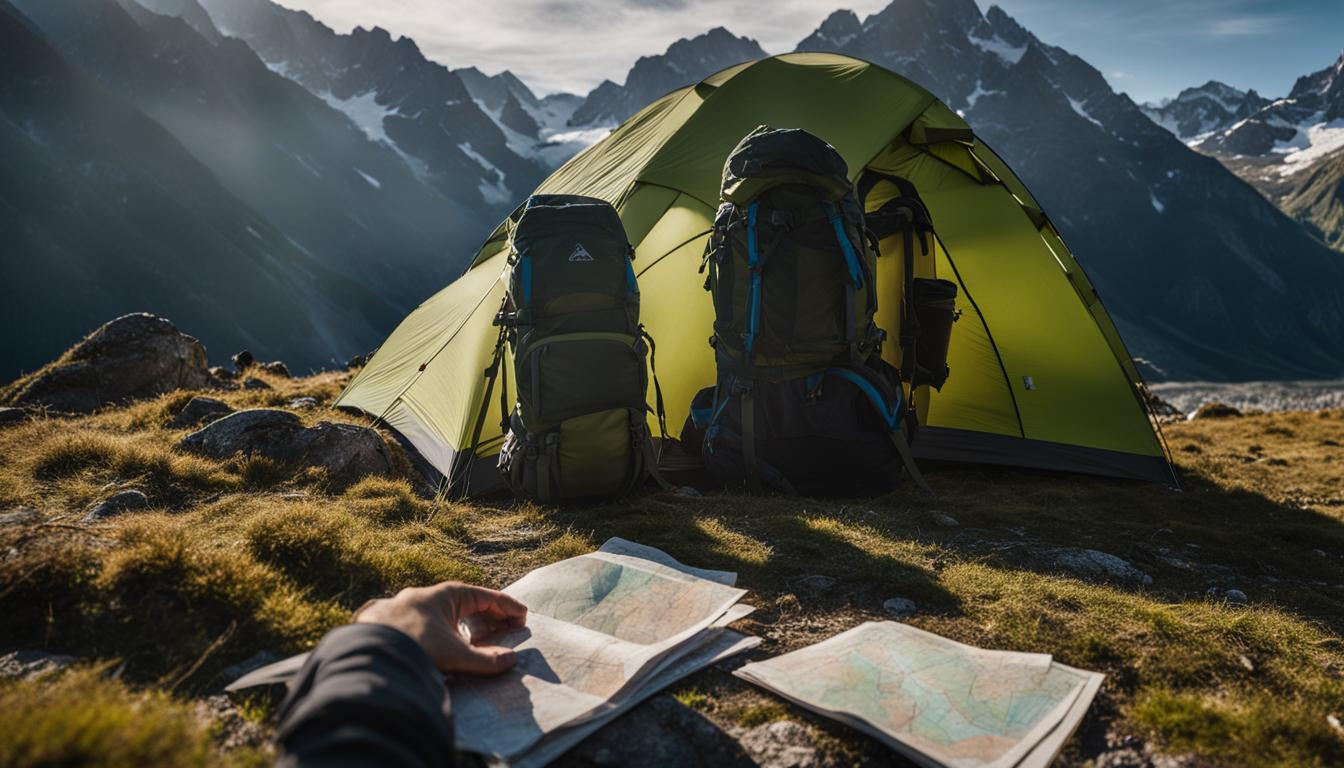Welcome to my beginner’s tutorial on backpacking! If you’re new to this adventurous activity, you’ve come to the right place. Backpacking is an incredible way to explore the great outdoors, connect with nature, and challenge yourself. But before you hit the trails, it’s essential to understand the basics and be well-prepared.
In this tutorial, I will guide you through the essential gear checklist for beginners, share valuable tips to make your backpacking journey more enjoyable, and emphasize the importance of safety. By the end, you’ll have all the knowledge you need to embark on your first backpacking adventure with confidence. So, let’s get started!
Key Takeaways:
- Backpacking is an exciting and rewarding adventure for beginners.
- Having the right gear is crucial for a successful backpacking trip.
- Choose a beginner-friendly trail and plan your itinerary in advance.
- Stay fueled by packing enough food and prioritize safety throughout the journey.
- Backpacking can become a lifelong passion with the right preparation and mindset.
Essential Backpacking Gear Checklist for Beginners

When it comes to backpacking, having the right gear is essential for a successful and enjoyable trip. As a beginner, it’s important to make sure you have all the necessary equipment to ensure your safety, comfort, and convenience. Here is a comprehensive backpacking gear checklist that covers all the essentials you’ll need on your journey.
Backpacking Gear Checklist:
- Backpacking backpack: Choose a durable and comfortable backpack that fits your needs and body type.
- Backpack cover: Protect your gear from rain by using a waterproof backpack cover.
- Tent: Invest in a lightweight and easy-to-setup tent that provides adequate shelter.
- Sleeping bag: Choose a sleeping bag that is appropriate for the weather conditions you’ll be facing.
- Compression sack: Use a compression sack to minimize the size of your sleeping bag for easier packing.
- Sleeping pad: Ensure a comfortable night’s sleep by using a sleeping pad to cushion the ground.
- Pillow: Opt for a lightweight and compact camping pillow for added comfort.
- Headlamp: A headlamp is essential for navigating in the dark and performing tasks at night.
- First aid kit: Pack a first aid kit with essential items like bandages, antiseptic wipes, and pain relievers.
- Trekking poles: Improve stability and reduce strain on your joints with trekking poles.
- Bug spray: Protect yourself from pesky insects by using bug spray with DEET.
- Lip balm with sunscreen: Keep your lips protected from the sun’s rays by using lip balm with SPF.
- Sunscreen: Apply sunscreen regularly to protect your skin from harmful UV rays.
- Fire starter: Make sure you have a reliable fire starter to help you start a campfire.
- Water reservoir: Stay hydrated on the trail by carrying a water reservoir or hydration bladder.
- Water filter and tablets: Ensure access to clean drinking water by carrying a water filter or purification tablets.
- Map and compass: Always carry a map and compass to navigate your way through unfamiliar terrain.
By checking off each item on this backpacking gear checklist, you’ll be well-prepared for your adventure in the great outdoors. Remember to choose gear that is lightweight, durable, and suits your specific needs. Happy backpacking!
Sources:
“Backpacking Gear Checklist for Beginners.” The Adventure Junkies, www.theadventurejunkies.com/backpacking-gear-checklist-for-beginners/.
| Item | Description |
|---|---|
| Backpacking backpack | A durable and comfortable backpack for carrying all your gear. |
| Backpack cover | A waterproof cover to protect your backpack from rain. |
| Tent | A lightweight and easy-to-setup shelter for camping. |
| Sleeping bag | A warm and appropriate sleeping bag for the weather conditions. |
| Compression sack | A sack to compress and pack your sleeping bag. |
| Sleeping pad | A pad for cushioning and insulation while sleeping. |
| Pillow | A lightweight and compact camping pillow for added comfort. |
| Headlamp | A hands-free light source for navigating in the dark. |
| First aid kit | A kit with essential medical supplies for emergencies. |
| Trekking poles | Poles to improve stability and reduce strain on joints. |
| Bug spray | A repellent to protect against insects. |
| Lip balm with sunscreen | A lip balm with SPF to protect lips from the sun. |
| Sunscreen | A lotion to protect skin from harmful UV rays. |
| Fire starter | A tool to ignite a fire for warmth and cooking. |
| Water reservoir | A container for carrying water on the trail. |
| Water filter and tablets | Tools to purify water for drinking. |
| Map and compass | Navigation tools to find your way on the trail. |
Tips for Beginner Backpackers

As a beginner backpacker, there are a few important tips to keep in mind. Start by choosing a beginner-friendly trail and familiarize yourself with the region. Plan your itinerary, knowing where campsites, water access points, and potential bail-out options are. Take into consideration the elevation profile of the trail and select a route with mellow elevation gain. It is also essential to pack enough food and stay fueled throughout the trip. Additionally, make sure to prioritize safety by sharing your itinerary with someone, taking a wilderness first aid course, and having a contingency plan.
Here are some key tips for beginner backpackers:
- Choose a beginner-friendly trail
- Familiarize yourself with the region
- Plan your itinerary
- Consider the elevation profile
- Pack enough food and stay fueled
- Prioritize safety
“Choosing a beginner-friendly trail will help ensure a positive backpacking experience. Look for trails with well-marked paths, easily accessible campsites, and moderate difficulty levels. Familiarizing yourself with the region beforehand will give you a better understanding of the terrain, weather conditions, and any potential challenges you may encounter. Planning your itinerary allows you to have a clear idea of where you’ll be camping each night, where you can find water sources, and where you can exit the trail if needed. Consider the elevation profile of the trail and select a route that matches your fitness level. Packing enough food and staying fueled throughout the trip is crucial to maintain energy and prevent exhaustion. Prioritize safety by sharing your itinerary with a trusted friend or family member, taking a wilderness first aid course, and having a contingency plan in case of emergencies.”
By following these tips, beginner backpackers can have a safe and enjoyable experience in the great outdoors. Remember to always be prepared, stay informed, and make responsible choices to make the most out of your backpacking adventure.
What are the Essential Items for Backpacking as a Beginner?
When preparing for beginner backpacking trips, it’s crucial to pack light, versatile essentials. A reliable backpack, sturdy hiking boots, a comfortable sleeping bag, a durable tent, and a water purification system are all key beginner backpacking tips. Additionally, lightweight and compact cooking gear and a first aid kit are essential for safety and comfort.
Conclusion
So there you have it, fellow backpackers! We’ve covered the backpacking basics and provided a beginner’s guide to help you embark on your first adventure with confidence. By following these essential tips and having the right gear, you’ll be well-prepared for whatever challenges come your way.
Remember, it’s crucial to start with a beginner-friendly trail that suits your experience level. Don’t forget to pack all the essential gear from our checklist, ensuring your comfort, safety, and convenience throughout the journey.
Lastly, always prioritize safety by sharing your itinerary with someone you trust and taking a wilderness first aid course. By being prepared and informed, you’ll be able to handle unexpected situations and enjoy the wonders of backpacking to the fullest.
So, what are you waiting for? Grab your backpack, lace up your boots, and set off on an unforgettable adventure. With the right preparation, mindset, and a desire to explore, backpacking can become a lifelong passion. Happy trails, my fellow backpackers!

